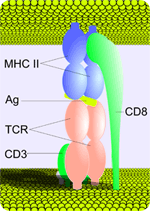CD Antigens

CD antigens mean the cell surface antigens of leukocytes. CD is the abbreviation of cluster of differentiation. When lymphocytes mature, they express diverse protein receptors on the cell surface, and the protein receptors are useful in determining the type and maturation stage of the cells being examined.
CD antigens are named according to its related antibodies: 1) The monoclonal antibodies which identify the same antigen are treated as a group. the group is named as CD plus a serial number 2) If the different antigenic determinant of CD antigens can be identified by specific monoclonal antibodies. Then the antibody is named as CD plus a number plus a lowercase letter.
CD antigens actually are subpopulations and functional types of leukocytes. They take part in immune reaction as receptors for cell communication. Though only a fraction of CD molecules have been known well, most of them have an important function. In the example of CD4 and CD8, these molecules are critical in antigen recognition. Others (e.g., CD135) act as cell surface receptors for growth factors.
BiologicsCorp(BIC) mainly manufactures CD72 and CD40. When B cells are exposed to CD72 antibodies, a variety of signaling pathways are activated and MHC class II expression and B cell proliferation can be induced. This is the CD72’s function. CD40 ligand can induce cytokine production and tumoricidal activity in peripheral blood monocytes. It also stimulates proliferation of activated T-cells and accompanies with the production of IFN-gamma, TNF-alpha and IL2.
Our products are only for laboratory research use, not intended for diagnostic or therapeutic purposes.
Ex Tax: $0.00
Ex Tax: $0.00

